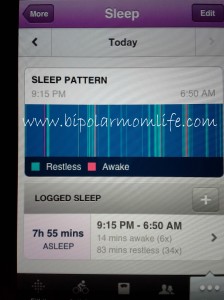My blog turns four years old this August. Having come to this little corner of the internet for nearly four years, writing my story of how I've navigated pregnancy and beyond despite living with the diagnosis of Bipolar disorder type 1, I tend to get quite a few questions from my readers. The most common ones come from young women who like me, wondered how they would be able to manage their illness and still be able to care for a newborn. A newborn who would grow into a baby with many demands.
I certainly am not perfect, nor am I an obstetrician or psychiatrist. I'm just a regular mom who, after having found out she had bipolar disorder, wasn't going to let it get in the way of her dreams of having a family. These are my reflections, looking back on my experiences of having my two children (now 6 and 4). This is what happened to me, and how I'd do things differently if I were to have a third child. (We are 99% sure we won't be having another one, in case you're wondering.)
Accepting the diagnosis
Bipolar disorder is a challenging, life-long illness. The first year or two of learning to live with the diagnosis can be devastating and all-consuming. When I was first diagnosed, ten years ago at the age of 26, I had to resign from a career that I excelled at in order to focus on getting well. It took an entire year for me to work with my doctors and therapist to find a medicine and figure out a treatment plan that worked for me. I was able to overcome severe depression and crippling anxiety, and even suicidal thoughts thanks to the vigilance and support of my husband and parents. Once I found stability, and was able to maintain it for a year, my thoughts of starting our family began to take root.
Although I was able to taper off my medicine (under the close supervision of my psychiatrist), and I had a normal, healthy pregnancy, we were not prepared for what would happen next. Not only was having our first child an incredible shock to my system (I had an emergency C-section after 17 hours of laboring - no pushing, but since the baby wasn't tolerating contractions and I wasn't dilating, my OB made the call for surgery), but nothing can prepare you for how you'll react to motherhood. On top of all this, I had put an enormous amount of pressure on myself to breastfeed. I thought, from all the pregnancy literature I had been devouring before the baby arrived, that breastfeeding was the only acceptable means of feeding the baby.
I was wrong and I learned the hard way.
Even though I knew that lack of sleep was a trigger for me, I didn't realize how little I'd be sleeping once the baby arrived, especially due to trying to nurse. I barely slept at all in the hospital since the nurses checked my vitals every hour because of the surgery. Exhausted doesn't even begin to describe how I felt. But I couldn't take my eyes off our son. We had created a baby. I was in awe of this little person I was holding. It didn't seem real. Maybe partly because I was headed into the throws of mania even before we left the hospital.
1. Have a plan for once you get the baby home
With our first baby, I did everything and wouldn't let anyone help. I was trying to succeed at breastfeeding and if someone gave the baby a bottle, he might not go back to nursing. Which meant that I was always the one getting up in the middle of the night to feed and change the baby.
With our second, we had a plan. For the first two weeks, someone would be available to take the middle-of-the-night feedings. My parents stayed with us for a week, so they took turns during the first week home, and then my husband took over during weeks two to four. This allowed me to get a solid stretch of 6-8 hours of sleep a night, critical to my recovery from the birth (a repeat c-section) and to prevent mania from creeping in. I learned to protect my sleep, and because of this, was able to stay mentally healthy once we brought our daughter home.
2. Don't feel guilty for formula-feeding
I breastfeed our son for the first four weeks of his life, and then ended up in the psych ward for a week because of postpartum psychosis. Having to stop breastfeeding was devastating, but on the way home from the psychiatric ward of the hospital I realized that being healthy for him was more important than anything. If I didn't have my health, I wouldn't be able to be present as a mother, no matter how I wanted to feed him.
For our daughter's arrival, we planned ahead of time that I would not breastfeed. Instead, I got excited about picking out bottles and supplies to formula-feed her, and my postpartum time with her was so much more enjoyable since I didn't have the extra pressure to make nursing work. I ended up having antenatal psychosis (mania during pregnancy) during the first trimester of my second pregnancy, so I had to take antipsychotics and a mood stabilizer during the pregnancy. Nursing was never an option and I accepted this reality.
3. When a medication works for your condition, weighing the benefits and risks is critical
Having experienced postpartum psychosis after the birth of my first child, we were better prepared, or so we thought, to navigate a second pregnancy successfully. We knew that I needed to protect my sleep, and I planned from the moment we decided we wanted to have another baby that I would formula-feed since I'd be returning to my medicine after the first trimester. Going off my medicine for the first trimester was my mistake.
From my research, I knew there was a risk to the fetus of a heart defect during the first trimester of pregnancy when women took the medication I was taking during pregnancy. So I made a plan with my psychiatrist and the high-risk OB-GYN that I'd taper off the medicine when I found out I was pregnant, and I'd return to it once I cleared the first trimester. Only I hadn't weighed the benefits of staying on the med against the risk I was taking.
I was closely monitoring things, testing for pregnancy on the earliest day possible following my fertile period. When I finally got a positive test, my excitement over finally being pregnant (we tried for about nine months) took ahold of my body and would not let go. My mind raced with potential baby names as I'd lie awake in bed not able to fall asleep.
Would it be a girl? How would our toddler react when he met his new sibling? What would it be like to be a Mommy to two little ones?
Within a week of very little sleep I was manic and it was quickly leading to psychosis. Having witnessed my manic symptoms before, my husband quickly took action and had me hospitalized. I was five weeks pregnant with our daughter.
When I returned home, medication was required to keep me stable. I went back to the high-risk OB-GYN for a post-hospitalization check-up and was scheduled for regular checkups and monitoring of the baby throughout the pregnancy. Luckily, she was born completely healthy and I had a wonderful postpartum period with no complications. I learned that my risk for psychosis due to the lack of medication in my system was far greater than the risk to my baby in utero.
*****
If you're considering pregnancy or are currently pregnant, I urge you to work closely with your psychiatrist and OB-GYN to monitor and manage your bipolar symptoms during pregnancy and in the postpartum period. There are great resources available online to help you as you navigate pregnancy: Postpartum Progress, Postpartum Support International, and if you're in the Washington, DC metro area (Virginia, Maryland and the District), the newly developed DMV-PMH Resource Guide maintains a comprehensive and current regional directory of specialized mental health providers, support groups, advocacy organizations, and other relevant clinical resources pertaining to perinatal mental health.
There are resources available. Please don't hesitate to ask for help. You can be a mom despite bipolar.








